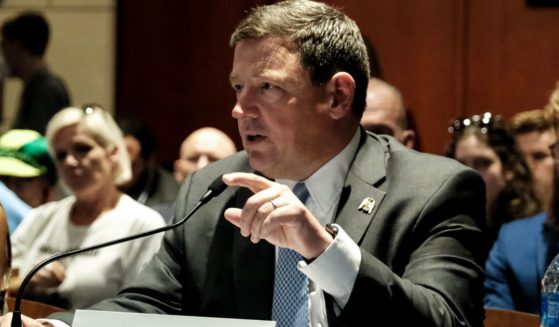Air Force Intercepts Nuclear-Capable Russian Bombers Just off US Coast
Two Russian bombers were intercepted Friday by U.S. Air Force jets as they flew within 200 miles of the Alaskan coast.
The North American Aeorospace Defense Command announced the intercept, Fox News reported.
The incident was the first time in roughly a year that Russia had send its Cold War-era Tupolev Tu-95 “Bear” bombers that close to Alaska. The Tu-95 is capable of carrying nuclear weapons.
“At approximately 10 a.m. ET, two Alaskan-based NORAD F-22 fighters intercepted and visually identified two Russian TU-95 ‘Bear’ long-range bomber aircraft flying in the Air Defense Identification Zone around the western coast of Alaska, north of the Aleutian Islands,” NORAD spokesman Canadian Army Maj. Andrew Hennessy said in a statement, according to CNN.
The bombers were “intercepted and monitored by the F-22s until the bombers left the ADIZ along the Aleutian Island chain heading west,” the statement said.
NORAD said that although the bombers were within the air defense identification zone, which extends 200 miles from the U.S., they were never in U.S. airspace.
Fox News, citing sources it did not name, said the Russian places were within 55 miles of the coast when they were intercepted.
The Russian government acknowledged the incident, according to Radio Free Europe.
The Russian Defense Ministry said the U.S. stealth fighters accompanied the Russian bombers for about 40 minutes, the RIA Novosti news agency reported.
The fighters did not come within 100 meters of the bombers, RIA quoted the defense ministry as saying.
The incident is the second this month involving Russian and U.S. forces.
A Russian Sukhoi Su-27 jet buzzed a U.S. Navy reconnaissance P-8 while both were flying in international airspace over the Baltic Sea.
Russia has flown bombers off the coast of Alaska before, but the last time it did so in such close proximity to the state was on May 3, 2017.
The latest incident comes as tensions between the United States and Russia are on the rise.
Last week, the United States announced it would reconstitute the Second Fleet, which during the Cold War had been responsible for patrolling the North Atlantic.
“Our National Defense Strategy makes clear that we’re back in an era of great power competition as the security environment continues to grow more challenging and complex,” Chief of Naval Operations Admiral John Richardson said at the time, according to the BBC.
Truth and Accuracy
We are committed to truth and accuracy in all of our journalism. Read our editorial standards.
Advertise with The Western Journal and reach millions of highly engaged readers, while supporting our work. Advertise Today.












